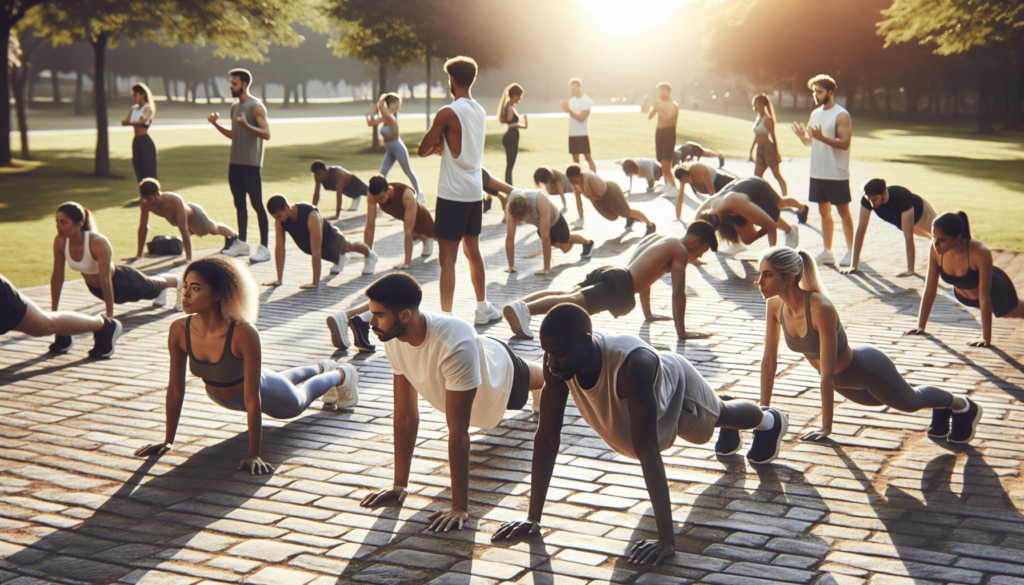Diving into the world of fitness can seem daunting, but incorporating bodyweight exercises into your routine may just be the key to unlocking a host of wonderful benefits. Simple yet powerful, these exercises leverage your own body’s weight to boost strength, enhance flexibility, and improve cardiovascular health—all without the need for expensive equipment or gym memberships. From push-ups and planks to squats and lunges, the versatility of bodyweight training allows you to work out anytime, anywhere. Whether you’re a beginner or an experienced athlete, understanding the advantages of this accessible form of exercise can significantly enhance your fitness journey. Have you ever wondered why so many people are ditching traditional gym equipment and turning towards bodyweight exercises? It might have caught your eye seeing folks swinging from bars or expertly balancing their body weight at the park. There’s a solid reason behind this shift — bodyweight exercises aren’t just a simple fitness fad; they can be transformed into a powerful component of your fitness regime.
What Are Bodyweight Exercises?
Bodyweight exercises, as the term indicates, involve using your own body weight to provide resistance against gravity. These exercises are incredibly versatile and can be done almost anywhere without the necessity of weights or machines. From push-ups and pull-ups to squats and sit-ups, the variety is nearly endless.
Understanding the Basics
When you leverage your body weight as resistance during exercises, you are essentially using natural and functional movements that not only help in building strength but also improve balance, flexibility, and coordination. This makes bodyweight training a holistic approach to fitness that benefits various aspects of physical health.

Key Benefits of Bodyweight Exercises
1. Convenience and Accessibility
One of the major charms of bodyweight exercises is their convenience. You don’t need expensive memberships or fancy equipment. Whether you’re at home, in a hotel room, or at a park, you can perform these exercises. This ease of access makes it simpler to stick to a routine, as you can squeeze in workouts according to your schedule.
2. Enhances Functional Strength
Another vital advantage is the improvement of functional strength. These exercises help in strengthening muscles that are used daily for various activities like lifting, pushing, and pulling. By improving muscle coordination and strength, bodyweight exercises make everyday tasks easier and decrease the risk of injuries.
3. Promotes Flexibility and Mobility
Rather than restricting your motions to particular angles as machines usually do, bodyweight exercises often involve a full range of motion. This not only enhances your flexibility but also aids in improving overall mobility. Exercises such as lunges and yoga poses are perfect examples that stretch and strengthen your muscles.
4. Benefits to Cardiovascular Health
When bodyweight exercises are performed in a circuit or with little rest between sets, they can deliver a high-intensity workout that boosts heart rate and respiratory endurance. This cardiovascular workout helps in reducing heart disease risk, improving blood circulation, and decreasing blood pressure.
5. Scalability
Whether you are a beginner or an advanced athlete, bodyweight exercises can be modified to suit your fitness level. Progressions and regressions make it possible for you to adjust the difficulty of the workout. For instance, a standard push-up can be modified to a knee push-up for beginners or elevated to a one-armed push-up for an advanced exerciser.
6. Cost-Effective
Without the need for gym memberships or investing in equipment, bodyweight exercises are extremely cost-effective. This is particularly beneficial for individuals on a tight budget or those who prefer a minimalist lifestyle.
7. Increases Balance and Stability
Performing exercises that rely on body weight tends to involve balance and coordination, which strengthens stabilizing muscles around key joints and improves overall stability. This is particularly important as balance tends to decline with age.
8. Mental Health Benefits
The simplicity and accessibility of bodyweight exercises also contribute to improving mental health. Regular physical activity is known to decrease stress levels, anxiety, and symptoms of depression, while boosting self-esteem and cognitive function.

Implementing Bodyweight Exercises in Your Routine
Getting Started
The beauty of bodyweight training is that you can start right away. Begin with basic exercises and gradually increase the intensity as your strength and confidence grow. Always focus on maintaining correct form to maximize benefits and minimize the risk of injury.
Designing a Balanced Routine
It’s essential to cover all major muscle groups in your routine to ensure balanced muscle development and reduce the risk of muscular imbalances. Incorporate a mix of pushing and pulling exercises, along with those targeting the legs and core.
Examples of Effective Bodyweight Exercises
- Push-ups: Great for the chest, shoulders, and triceps.
- Squats: Target the thighs, hips, and buttocks.
- Planks: Excellent for core stabilization.
- Burpees: A total-body workout that boosts the cardiovascular system.
Challenges and Progressions
As your fitness level improves, continue to challenge your body by increasing reps, reducing rest periods, or incorporating more advanced versions of the exercises. Routine variation prevents plateaus and keeps the workouts engaging and effective.

Common Myths and Misconceptions
Myth 1: Bodyweight Training Isn’t Effective for Building Muscle
While it’s true that heavy lifting is essential for substantial muscle mass, bodyweight exercises can also be incredibly effective especially when performed with high intensity and volume.
Myth 2: You Can’t Get a Proper Cardio Workout
By manipulating variables like speed, intensity, and rest, bodyweight exercises can transform into high-intensity interval training sessions that provide substantial cardiovascular benefits.
Tips for Success
Stay Consistent
Like any fitness regime, the key to seeing results with bodyweight training is consistency. Set a regular schedule for your workouts and stick to it.
Listen to Your Body
Pay attention to how your body feels. If you notice undue pain or discomfort, it might be time to adjust your form or take a rest.
Keep It Fun
Switch up your routines, challenge yourself with new exercises, and set short-term goals to keep your sessions fun and motivational.

Wrapping It Up
Bodyweight exercises blend simplicity, effectiveness, and versatility in a way that few other forms of exercise can. Whether you’re looking to improve your physical fitness, boost your mood, or even save some money, incorporating bodyweight workouts into your routine can offer a multitude of benefits. Why not start today and experience these advantages first-hand?
